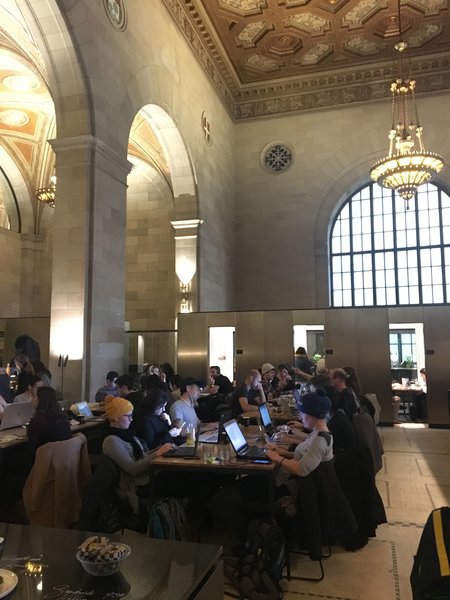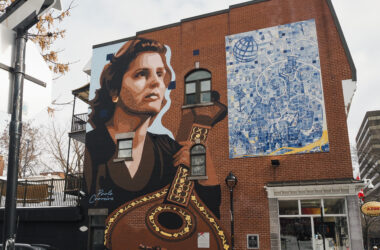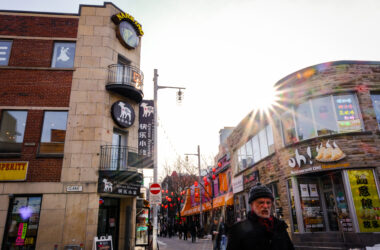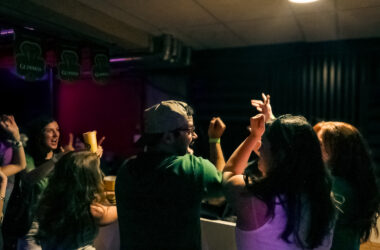Inspiration can come from anywhere, and Concordia Write Nights aim to help writers access it. The student-founded group organizes workshops, events, and writing groups in a variety of unusual locations across Montreal for anyone looking to develop their writing.
Started by the Students’ Association for Graduates in English (SAGE) at Concordia University in 2015, Write Nights allow writers to work in each others’ presence while drawing creativity from an unconventional environment, such as a museum or historical site. At any given event, attendees’ level of participation with the group is left completely up to them; writers have the choice to work in solitude and silence, or to engage with other writers and seek out constructive criticism on their work.
According to Liam Lachance, a Master’s student in Creative Writing at Concordia University and an organizer of the Write Nights, one of the goals behind the event series is to push local writers out of the comfort of their writing routines, and, in turn, mitigate their creative block. The offbeat locations where these events are held provide a respite from the usual spots in which many writers tend to work, like libraries and offices, which can grow stale with time, and negatively affect their writing.
“I always want to write different things,” Lachance said. “So, if I’m always writing in the same places, I’ll probably end up writing stories that have already been written in a way [and] it misses a lot of the senses.”
On Feb. 19, Write Nights spent the afternoon in Crew Cafe, a historic bank-turned-coffee shop in the Old Port. Known as a beautiful and productive space with chandeliers hanging from incredibly high ceilings, McKenzie chose this place for its unique design, rich history, and dual use as a coffee shop and workspace.

“I’m interested in how settings affect what we write if we’re trying to do stuff that’s not conventional,” Lachance said. “There’s a norm that to write you need to read and sit in quiet spaces and I disagree with that. To me, the writing will come out very visual if you’re [just] sitting and looking, […] but [there is] rarely sound and smell and taste. I think those are really important things. And like in a cafe, I’m very aware of [these other senses].”
In addition to unlocking potential inspiration through the atypical writing spaces, Write Nights aim to bring the writing community together. Writing can be an isolating activity, but these events make the practice more social, even without pressuring attendees into active conversation. In turn, the event creates a feeling of mutual support for those who are passionate about creative writing.
“It’s an interesting dynamic because you don’t really know how many people are in these [events] with me unless they specifically come up and talk to me,” Lachance said. “A lot of people are wanting to write on their own. It’s like a community, but not necessarily everybody [has] to work with each other and talk. So, it’s like the introverted sensibilities of writers really, in the group settings.”
While remaining inclusive for all personality types, Write Nights also hopes to make the practice of writing more accessible to anyone in Montreal looking to write, not just writing students or published writers.
“There’s like an idea that if you don’t identify as a writer you can’t write,” Lachance said. “[I think this] is wrong, so [Write Nights] is to open up the space in playful areas rather than writing alone.”
Making these events accessible socially is one thing, but inclusivity also means choosing spaces that are easy to access for those with disabilities. In planning the most recent event, McKenzie was worried about the amount of stairs in Crew Cafe, and how it could prevent writers with physical limitations from attending. Thus, for the next event, which occurred in the Biodome on March 5, he made sure it was handicap-friendly to allow access for those who needed it.
Alongside Write Nights, SAGE holds writing workshops several times a month, covering topics ranging from the whimsical and creative, such as lyric writing, to the logistical, such as how to get work published.
Furthermore, SAGE creates its own chapbook—a small paperback of approximately 30 pages—which publishes the pieces that have been written during the Write Nights. They are currently taking submissions, providing a publishing opportunity for aspiring writers, as well as cash prizes. This allows writers who struggle to get their work published to reach a larger audience.
Whether it’s through workshops or writing groups held in original spaces throughout the city, Concordia Write Nights provides writers of all backgrounds a creative outlet in which to open their writing to new sources of inspiration.
To find out more about Concordia Write Nights, follow them on Facebook.
A previous version of this article incorrectly referred to the source quoted, Liam Lachance, as Liam McKenzie. The Tribune regrets this error.








